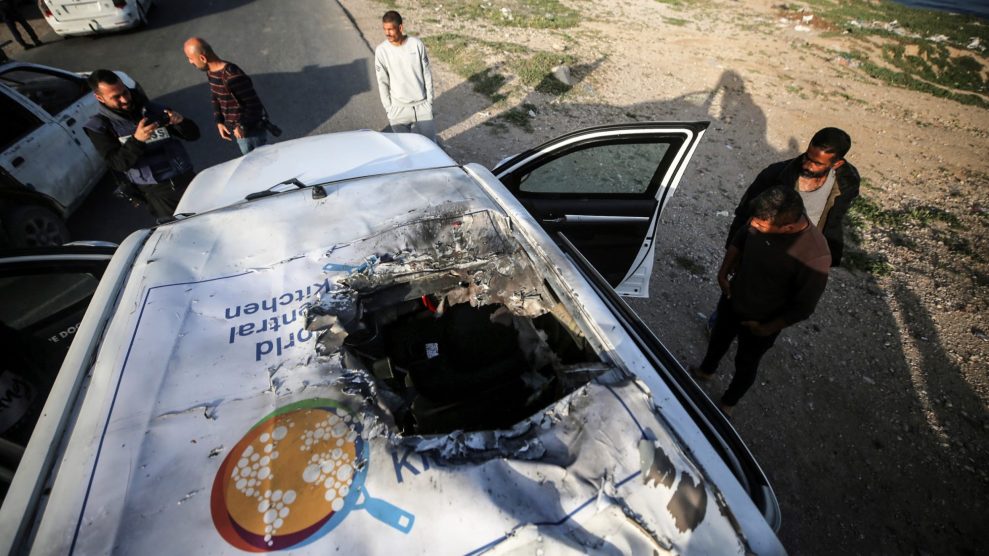
Seven aid workers from the World Central Kitchen were killed in an Israeli airstrike, according to the NGO.Majdi Fathi/NurPhoto/AP
This week, Israel fired three missiles at an aid convoy for the World Central Kitchen (WCK), killing seven workers delivering food in Gaza. The strike hit labeled vehicles, according to the group, which was founded by chef José Andrés and has become famous for delivering meals to disaster sites across the world.
The Israeli newspaper Haaretz reported a horrific scene: After survivors of the first two strikes switched to other vehicles in the convoy to escape, Israeli forces fired a third missile. The target, “defense sources” told the paper, was a member of Hamas who was not present in the vehicles.
Video shared by a Washington Post reporter shows that the explosives were dropped onto the aid group’s logo on the roof of the car.
Munition dropped right through the World Central Kitchen logo pic.twitter.com/RKcT01Z7SJ
— John Hudson (@John_Hudson) April 2, 2024
In a statement, World Kitchen CEO Erin Gore called the attack “unforgivable.”
“This is not only an attack against WCK,” Gore said, “this is an attack on humanitarian organizations showing up in the most dire of situations where food is being used as a weapon of war.”
As my colleague Noah Lanard reported, the United Nations’ most essential aid group in Gaza, UNRWA, has been kneecapped, exacerbating an acute humanitarian disaster wrought by a military campaign that has killed over 32,000.
Israeli Prime Minister Benjamin Netanyahu called the attack an “unintended strike” and “a tragic incident.” A spokesperson for the Israel Defense Forces said the military is investigating and has pledged to “share our findings transparently.”
World Central Kitchen said it was pausing its relief work in Gaza following the strikes, adding that it will be “making decisions about the future of our work soon.” The group said it has provided more than 43 million meals to Palestinians, the Associated Press reports. The pause on WCK’s work comes as the UN has said famine is “imminent” in Gaza.
According to Haaretz, this isn’t the first time WCK has been fired on:
On Saturday, an IDF sniper fired at a [WCK] car headed to a food warehouse in the Khan Yunis area. He hit the car’s windshield, but the volunteer inside was unharmed.
The World Central Kitchen immediately filed a complaint with the IDF after the incident, and demanded the army stop the fire toward its staff, and guarantee their safety when distributing food in the Gaza Strip, which is carried out with full coordination. The IDF did not comment on the organization’s inquiry about that incident.
Anera, another aid group working in Gaza, said it was also pausing operations in response to the Israeli drone strike. The group said that the killing of one of its workers, Mousa Shawwa, less than a month ago remains unexplained.
The deceased WCK aid workers hail from Australia, Poland, the United Kingdom, and Palestine, and included a dual citizen of the United States and Canada. Andrés said in a post on X that he is “heartbroken and grieving for their families and friends.”
He continued: “The Israeli government needs to stop this indiscriminate killing. It needs to stop restricting humanitarian aid, stop killing civilians and aid workers, and stop using food as a weapon.”
A spokesperson for the National Security Council said they were “heartbroken and deeply troubled by the strike,” adding, “humanitarian aid workers must be protected as they deliver aid that is desperately needed, and we urge Israel to swiftly investigate what happened.”
UNRWA said on Tuesday that 176 of its staff members have been killed during the war, including several cases in which they were killed while working.
Noah Lanard contributed additional reporting.










